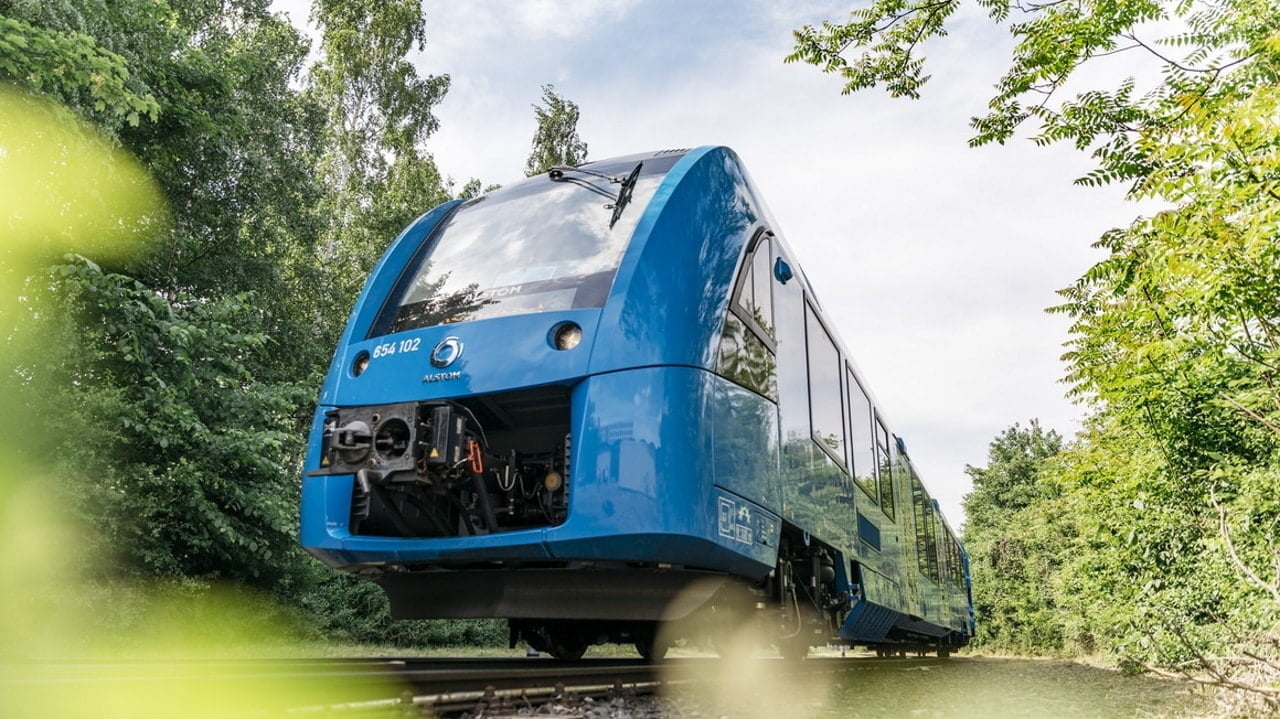After 530 days, and more than 180,000km (around 110,000 miles) driven, the trialling the world’s first two hydrogen trains has been a success.
Two of Alstom‘s Coradia iLint trains have been in passenger service since September 2018.
From 2022, 14 Coradia iLint trains will replace the diesel multiple units that are currently in operation with LNVG.
LNVG is the first operator to have belief in hydrogen trains, and have invested in 14 units and thirty years of power supply.
“Our two pre-series trains of the Coradia iLint have proven over the past year and a half that fuel cell technology can be used successfully in daily passenger service. This makes us an important driving force on the way to emission-free and sustainable mobility in rail transport”, comments Jörg Nikutta, Managing Director for Germany and Austria of Alstom Transport Deutschland GmbH. “We have also obtained valuable data from the trial operation of the fuel cell trains for the further development of the propulsion technology.”
“We are proud that we were the first railway company in the world to be allowed to operate the first two fuel cell trains on the Weser-Elbe network. From the very beginning, our passengers were very curious about the trains and their new propulsion technology. Besides its very low noise level, the hydrogen train was able to score with its emission-free operation, especially in times of climate change. The operation of the iLint was a very special motivation for our train drivers”, said Andreas Wagner, head of the SPNV division and authorized signatory of the Eisenbahnen und Verkehrsbetriebe Elbe-Weser GmbH (evb).
Carmen Schwabl, Managing Director of LNVG, adds: “With the successfully completed trial operation, the requirements for continuous operation of the hydrogen trains from 2022 are fulfilled. LNVG thus contributes to the implementation of sustainable, innovative and ecological mobility solutions, especially in rural areas. Alstom has made hydrogen history here. The project is of a great importance to industrial policy that goes far beyond Germany. Here, we are witnessing the first competitive product of hydrogen mobility at industrial level”, says Lower Saxony’s Minister of Economics and Transport, Dr. Bernd Althusmann.
“The Federal Ministry of Transport is very happy to support the beacon of modern mobility: the hydrogen train in Bremervörde. After all, this project is a flagship for the mobility of the future,” says Enak Ferlemann, Parliamentary State Secretary at the Federal Ministry of Transport and Digital Infrastructure. “Hydrogen is a real low-emission and efficient alternative to diesel. Especially on secondary lines where overhead lines are uneconomical or not yet available, these trains can travel cleanly and in an environmentally friendly way. We would like to see more such applications.”
Where Next?
RailAdvent Plus
Get image downloads, Prints and Streaming Video
News Homepage
For the Latest Railway News
RailAdvent Online Shop
Framed Prints, DVD’s / Blu-Ray’s and more
LocoStop Community
Come and share your railway pictures
Mainline Steam Info
Upcoming mainline steam tours/loco movements
Alstom
Visit their website





Responses
They could also be imported [normal procedure here in N.S.W and operate on lines such as Armidale to Wallangarra, Casino to Murwullumbah, Nyngan to Bourke, Bungendore to Captains Flat, Cootamundra to Junee via Stockingbingal, Ariah Park, Griffith etc.
Hydrogen trains are still a possibility and to operate them on major railway lines and smaller branch lines in England and Wales.
Perhaps hydrogen trains might be ideal to be used on the smaller branch lines in Southwest England, Bristol, Gloucestershire, Avon, Devon and Cornwall including:
Severn Beach Line
Heart of Wessex Line
TransWilts Line
Wessex Main Line
Avocet Line
Riviera Line
Tarka Line
Atlantic Coast Line
Looe Valley Line
Maritime Line
St Ives Line
Tamar Valley Line
Cornish Main Line
Portishead Line (when it reopens)
And on other branch lines in the Thames Valley area and West London including:
West Ealing-Greenford Line
Slough-Windsor & Eton Central Line
Maidenhead-Bourne End & Marlow Line
Regetta Line
Reading-Basingstoke Line